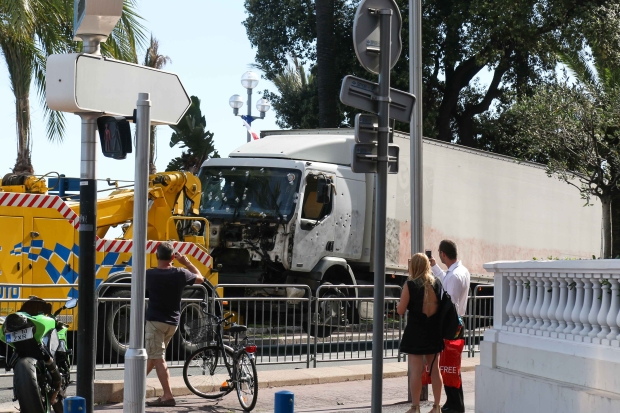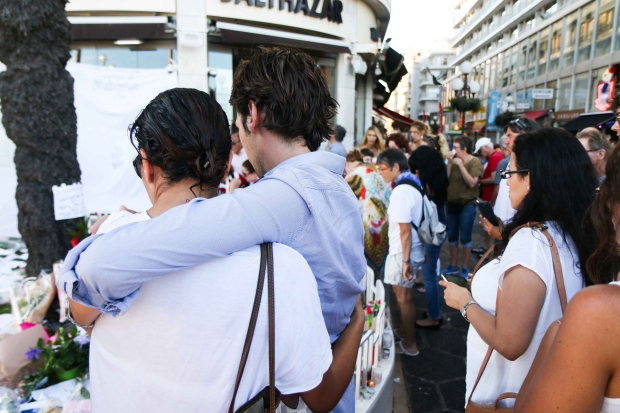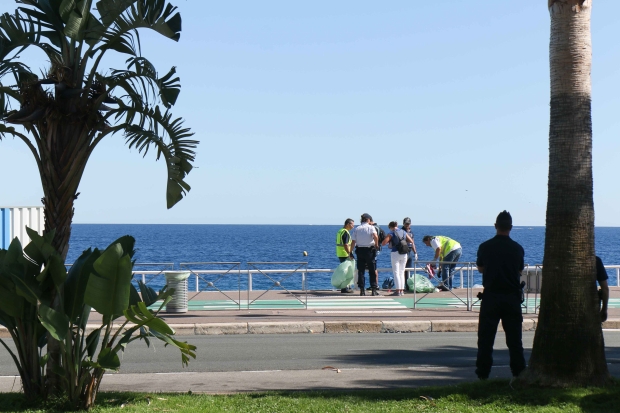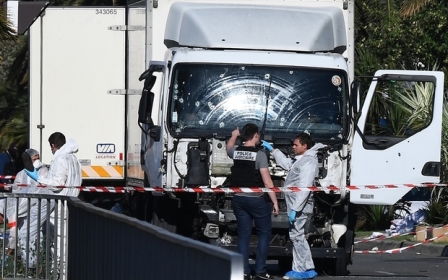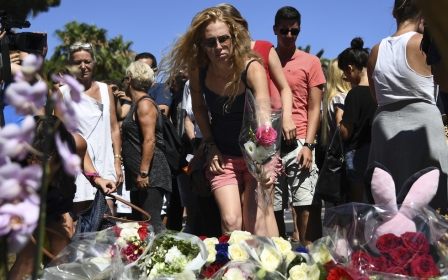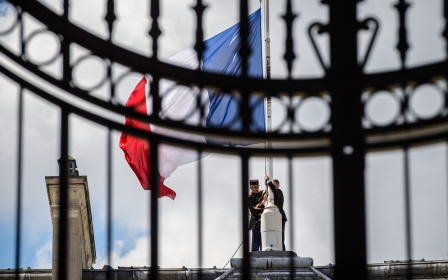Bastille Day attack: 'For the people of Nice, the summer is over'
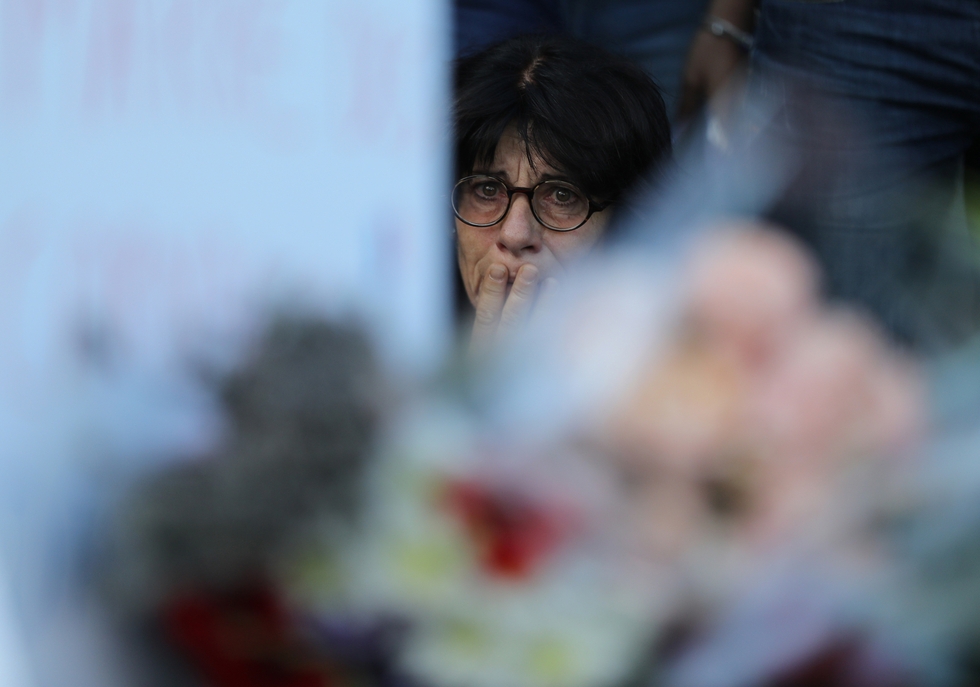
Nice, FRANCE - It is unusual in busy Nice to hear the sound of the ocean even while walking alongside it.
But on the day after at least 84 people died as a lorry drove trough a crowd celebrating Bastille Day, France’s national holiday, the steady rhythm of the waves is a comforting sound for those who came out to mourn. Silence has taken over the Promenade des Anglais, or the Prom, as locals call it.
“It is empty,” Nadine, a witness of yesterday's attack, said as she left the Prom. “It’s bizarre."
“I have never seen the Promenade that way,” said Christoph Tomasini, a Nice resident for 25 years. “You could always walk on both sides.”
Today, the large path next to the beach, as well as the road, were closed off by police as they continued to remove debris from Thursday night.
At a large memorial near the spot where the truck came to a rest as police shot and killed the driver, people laid flowers in front of the Restaurant Balthazar, a typical southern French “brasserie,” usually offering tapas.
On Friday, Balthazar gave out free water and sandwiches to exhausted bystanders.
“I saw a little girl,” Nadine, who did not want to give her full name, said. “You could only distinguish the body, but not her face.”
She had left the fireworks early but returned in her car to help as best as she could.
“I saw legs broken in two,” she said, trying to suppress her tears behind her dark sunglasses. “Bones … it was horrible.”
She wanted to spend Thursday outside, as watching the news at home made her sick. She went to the psychological centre at the Centre Universitaire Mediterranean, a place for victims and relatives to talk to volunteers, as well as to get religious council.
But as she left the centre, sadness also turned into desperate anger. She blames the state for having not provided enough security for Thursday's holiday. Among the mourners, she is not the only one expressing this feeling.
A big failure
“They secured Nice for the Euro,” she said of the recent football championships, but not for the fireworks and national holiday. “It’s a big failure of the state. There are police everywhere now, but it’s useless,” she said.
Thomasini, himself a lorry driver, was watching the firework display with his family. They left early because of the wind and the cold. Walking on the only open pavement along the Prom, he said the attack happened “because of their ****ing religion”.
“There is not enough security, and we let extremism develop,” he said.
The southern French department Alpes Maritimes is one of the bastions of the extreme-right Front National. And even though Tomasini did not say who he was voting for in elections due next year, his views resonate with a group larger then the supporters of the Front National leader, Marine Le Pen.
“They [Muslims] force their lifestyle upon us,” Tomasini said, but added that Thursday's attack doesn't "stop me from living. I’ll go out tonight with my little girl.”
Nice is known for its beaches, palm trees, monumental hotels and the Prom, a tourist hotspot dating back to the 19th century. But Nice is also yet another French melting pot of cultures and religions, with areas similar to Paris’s “banlieues” - strictly speaking "suburbs" but a term now often used perjoratively of areas dominated by immigrants.
At a memorial, debates flourish: debates about religion, the media, politics, exclusion. A young man argued France was too light when taking care of suspected terrorists. A young girl said: “The Quran and the Bible are the same, simply differently written.”
An older man jumped in, talking about respect and mutual understanding between religions.
“If we want to live in peace, you have to know the religion of the other,” he said. The young girl agreed.
One of the biggest local churches organised a mass to honour the victims. After the service, the priests standing outside in the evening sun continued to talk to the community.
“For the people in Nice, the summer is over,” Gil Florini, a local catholic priest said. He was called to the psychological emergency centre during the night to assist victims and relatives, together with imams and rabbis.
“I was in jeans and a shirt” when the mayor called, he recalled. “I quickly changed and drove down there, through all police checkpoints.”
He has yet to see how this eventful night will affect him in the long run, he said.
'He never practised Islam'
A little outside the city centre, prayers were held too. Boulevard de la Madeleine is home to one of two mosques in the city.
Nice and its department, Alpes Maritimes, isn’t a stranger to radicalisation. The department’s government recently closed five underground prayer houses, which it suspected of preaching violent Islamism. At Boulevard de la Madeleine, in front of the Ennur mosque, one community leader is worried about the possible fallout from the attack.
“The stigmatisation has already happened,” Ahmad Kassar, financial officer at the local Muslim association, Union des Musulmans des Alpes Maritimes.
At least 10 Muslims are among the dead in Thursday's attack, Kassar said, with another 20 wounded. He said it was “very likely” that someone of his community died, but it was too early to tell.
The profile of the attacker emerging from media reports – he was named as Mohamed Lahouaiej Bouhlel, a French citizen of Tunisian origin, known to police for violence and small crime – is proof that he was someone “who knew nothing of this religion,” Kassar said. The attacker is said to be a 31 years old and living legally in Nice.
“He never practised Islam,” he said. “Even his brother told the media that.”
Kassar was standing in the entrance of the mosque, a tiny door without religious symbols, on the ground floor of an apartment complex. Writing on the window reads, “Ennur Library – cultural centre La Madeleine.”
Florini, the catholic priest, too said he did not believe the attack was religiously motivated, and described the attacker as mentally ill.
Manuel Valls, the French prime minister, said the attacker “was a terrorist” and was “certainly somehow linked to radical Islam,” even though Interior Minister Bernard Cazeneuve refused to confirm this, saying he had no proof of links to radical jihad.
By the start of this year, at least 55 residents from the department Alpes-Maritimes had left for Syria or Iraq. “We didn’t see this problem coming,” Kassar said.
There is a problem with radicalisation “everywhere,” Kassar said, not only in Nice. He hopes that there will be no negative fallout from the attack, but concedes: “It can happen.”
After the November attacks in Paris, France saw a rise in crime directed against mosques and prayer rooms.
Kassar took part in a prayer for the dead earlier today. There was also a unique preaching in all French mosques, mourning the dead and condemning violence.
But in France, recent attacks have only added to the tension, and even if the motive of the attacker is not yet clear, this might not matter to many here.
Yet those mourning, young and old, will try to live on with what they saw. Like a group of German teenagers who had just completed their final school exams.
Nice was their celebratory trip for their accomplishment, but their first day in the city ended in tragedy as they witnessed the attack first-hand. Tearfully, they came at night to mourn and light candles.
As they did, the waves continued, less than 200m away.
“Life will go back and appear normal again,” Florini said, with a hopeful and reassuring tone.
And as the scent of candles filled the air around the two memorial sites along the Promenade, police moved their barricades and cars filled the road. Life came back, and made the sound of the ocean waves disappear again.
This article is available in French on Middle East Eye French edition.
Middle East Eye propose une couverture et une analyse indépendantes et incomparables du Moyen-Orient, de l’Afrique du Nord et d’autres régions du monde. Pour en savoir plus sur la reprise de ce contenu et les frais qui s’appliquent, veuillez remplir ce formulaire [en anglais]. Pour en savoir plus sur MEE, cliquez ici [en anglais].


